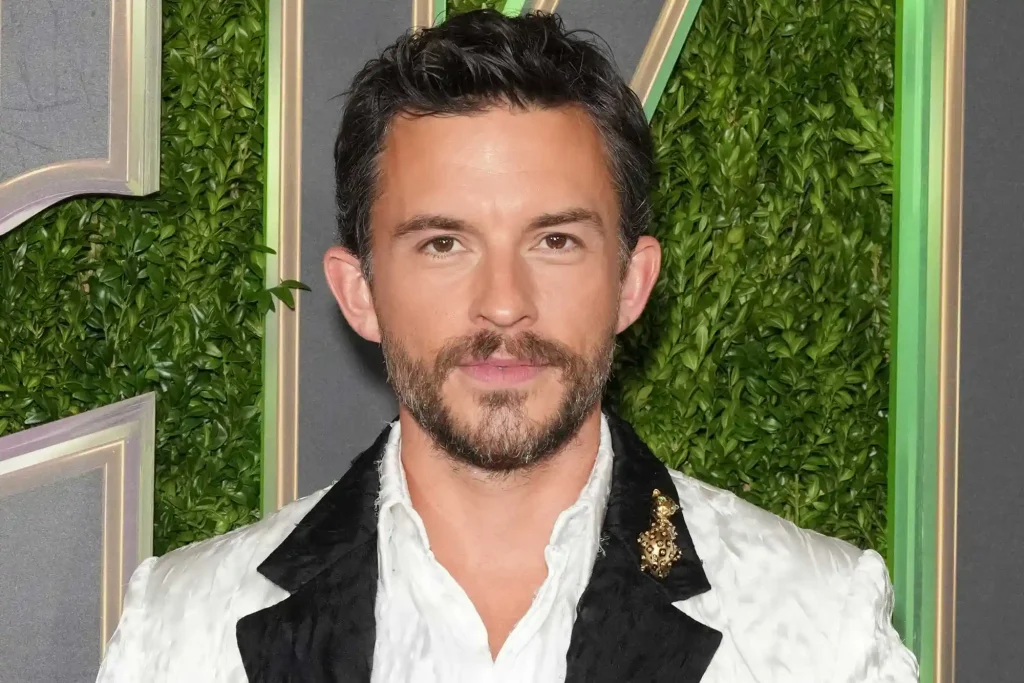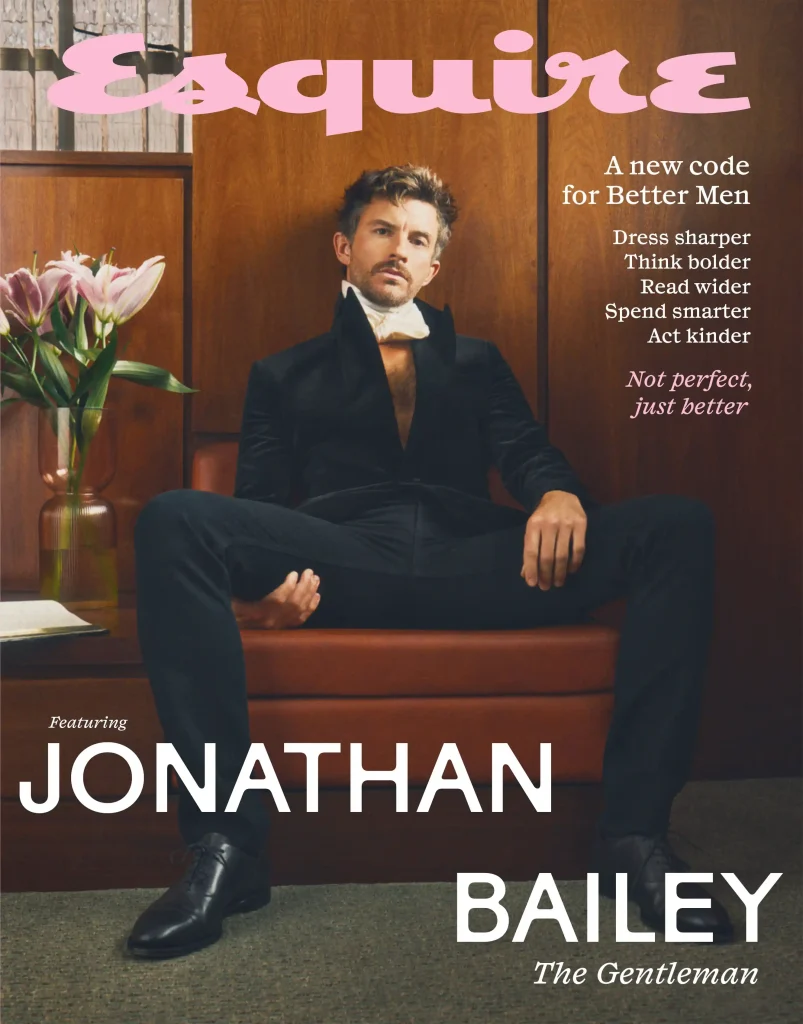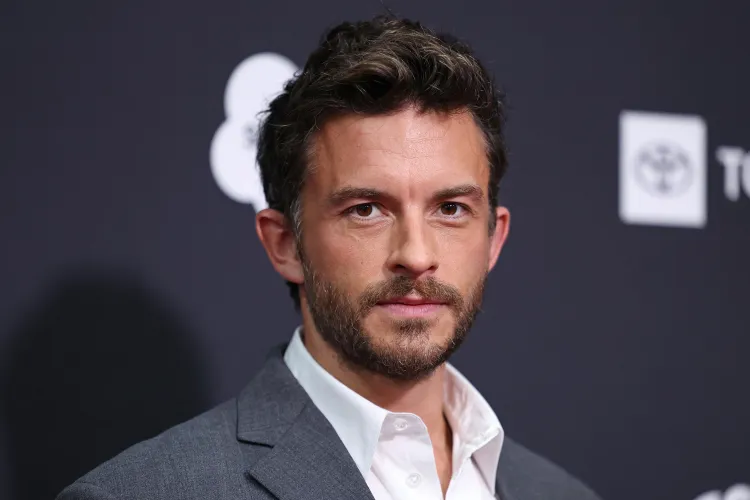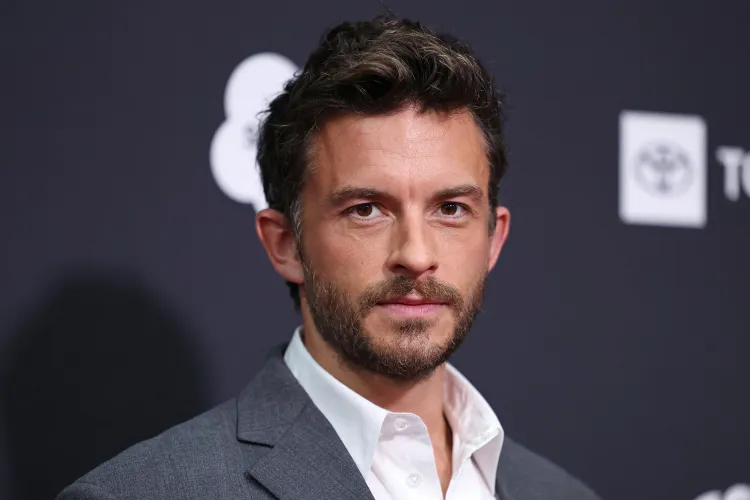Jonathan Bailey Shares Emotional Tribute to His “Inspiring” Teacher Who Died by Suicide, Saying “I Think About Him a Lot” and How That Loss Shaped His Life
Jonathan Bailey, known for his charm, depth, and grace both on and off screen, is opening up about a loss that still lingers deeply in his heart. In a recent interview with Esquire U.K. for the magazine’s Winter 2025 issue, the 37-year-old Bridgerton actor shared rare insight into one of the most emotional experiences of his youth — the death of his teacher and mentor, Dr. David Brunton, who died by suicide during Bailey’s time at Magdalen College School in Oxford, England. Speaking with sincerity and reverence, Bailey reflected on how that loss left a lasting imprint on his life, his view of mental health, and the profound responsibility he feels to honor those who make a quiet difference in the lives of others.

For many fans, Bailey’s openness about such a deeply personal topic reveals a new layer to the actor’s humanity. While the world knows him for his captivating performances in Bridgerton, Fellow Travelers, and numerous stage roles, Bailey’s reflections reveal a man deeply attuned to the fragility of life and the unseen struggles that people often carry. In the interview, he spoke about Dr. Brunton not simply as an educator but as a guiding force during his formative years — someone who saw potential in him before he fully saw it in himself.
Bailey recalled those days with a mixture of gratitude and sadness. He described Dr. Brunton as “inspiring, encouraging, and larger than life,” a teacher whose classroom felt alive with energy and intellectual curiosity. “He was one of those teachers who just made you feel like you could do anything,” Bailey shared, remembering how Dr. Brunton nurtured his love for storytelling and performance. The actor admitted that he still thinks about his former teacher often, reflecting on the influence he had not just on his education but on his entire outlook on creativity and empathy.

When news of Dr. Brunton’s death reached the school, Bailey said it felt like “the ground had been pulled out from under” him. He was only in his late teens at the time, just beginning to understand who he was and what he wanted to pursue in life. The shock of losing someone he admired so much — and in such tragic circumstances — forced him to confront questions about purpose, loss, and emotional vulnerability long before adulthood. “It was one of the first times I realized how invisible someone’s pain can be,” he said softly. “I think about him a lot, even now.”
The Bridgerton star’s willingness to talk about suicide and mental health with honesty is part of a broader movement among public figures to shed light on the realities of emotional struggle. Bailey’s reflections echo the experiences of countless people who have lost mentors, teachers, friends, or family members to suicide — a reminder that even those who seem confident and secure can be fighting unseen battles.
Bailey explained that his teacher’s death not only left an emotional mark but also shaped his sense of responsibility as an artist. “He was someone who believed in the transformative power of creativity,” Bailey said. “That’s something I’ve carried with me in every role I take.” He added that he often finds himself thinking about how Dr. Brunton encouraged his students to express themselves and find beauty even in moments of chaos or doubt.
Those lessons, he said, became the foundation of his approach to acting — a craft that demands both vulnerability and courage. “In a way, everything I’ve done since then is an attempt to live up to the kind of belief he had in me,” Bailey reflected. “He gave me that first push to believe that stories matter — that they can heal, connect, and give people hope.”

In discussing such a personal loss, Bailey also acknowledged the importance of mental health awareness, particularly in education. He expressed empathy for teachers, describing them as “unsung heroes” who often carry immense pressures while shaping young lives. “It’s not an easy job,” he noted. “Teachers give so much of themselves, and sometimes they hide how much they’re struggling because they don’t want to burden anyone. That’s why it’s so important we check in — really check in — on the people who are always there for others.”
Bailey’s emotional candor stood out because of how gently he balanced grief with gratitude. His words didn’t dwell on tragedy but instead honored his teacher’s legacy with respect and compassion. “He was someone who made learning feel like discovery,” he said. “He made you feel seen. That’s something I think every person deserves — to feel seen, even just once, by someone who believes in them.”
It’s rare for an actor of Bailey’s prominence to speak so vulnerably about personal grief, especially one tied to such a sensitive topic. But those who have followed his career know that authenticity has always been one of his defining traits. Whether discussing his acting process, his personal growth, or broader social issues, Bailey’s ability to blend empathy with eloquence has made him one of the most grounded voices in modern entertainment.
He has spoken previously about the pressures of the industry and the importance of emotional honesty, noting that the entertainment world can often feel detached from real life. In his conversation with Esquire U.K., however, Bailey brought those ideas full circle — connecting them back to the lessons he learned from Dr. Brunton. “He taught me that creativity isn’t just about performance,” Bailey said. “It’s about understanding people. It’s about listening, observing, and being curious about what makes others tick.”
Friends and colleagues who know Bailey well describe him as someone who carries deep empathy into every role. Those qualities, they say, were clearly visible in his breakout performances — whether as the complex and passionate Anthony Bridgerton or as Tim Laughlin in Fellow Travelers, a role that earned him widespread acclaim for its emotional honesty. His ability to convey tenderness and humanity on screen, many believe, is rooted in experiences like these — the kind that teach a person how precious and fleeting life can be.
When asked how he continues to process that loss, Bailey paused before answering. “I think it’s something that never fully leaves you,” he said. “But in a way, I’ve turned that grief into a kind of motivation. It reminds me that what we do — in art, in life — matters. It can change someone’s day. It can save someone’s life.”
As part of the Esquire feature, Bailey also reflected on the responsibility that comes with visibility. As his career has grown, so too has his platform — and with it, his commitment to using it for good. He spoke about the need to normalize conversations around mental health and to approach them with compassion rather than judgment. “We have to make it okay to talk about pain,” he said. “It’s not weakness. It’s human.”
Bailey’s reflections are particularly timely. Recent years have seen a global increase in discussions around suicide prevention and emotional well-being, especially in creative industries where pressure and scrutiny can take a toll. His openness contributes to a growing cultural shift — one where vulnerability is no longer seen as a flaw, but as a form of strength.
The actor also emphasized that speaking about loss, even decades later, can be healing. “I don’t think there’s ever a wrong time to remember someone who mattered to you,” he said. “Sometimes, talking about them keeps them alive in the best way possible.”
Fans who read the interview responded with overwhelming support, praising Bailey for his honesty and compassion. Many shared their own experiences of losing mentors, expressing gratitude that someone of his stature would shed light on such a deeply personal yet universal topic.
As Bailey continues to balance a thriving career with his advocacy for empathy and mental health awareness, it’s clear that his late teacher’s influence continues to echo through his life. Whether on stage, in front of a camera, or in interviews like this one, Bailey embodies the same sincerity and curiosity that Dr. Brunton once inspired in him.
Toward the end of his reflection, Bailey’s voice softened as he described one final memory: his teacher standing at the front of the classroom, passionately explaining a passage of literature that seemed to come alive through his words. “He loved the way stories could open people up,” Bailey said. “That’s something I’ll never forget. Every time I step into a role, every time I tell a story, I think about that.”
Jonathan Bailey’s tribute to his teacher serves as both a personal reflection and a reminder of the invisible threads that connect lives across time. In sharing his grief, he not only honored one man’s legacy but also offered comfort to countless others who know what it means to lose someone who helped shape who they are. “I think about him a lot,” Bailey repeated softly. “And I hope, in some way, he’d be proud.”


